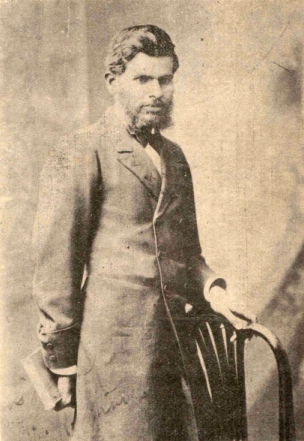Top Qs
Timeline
Chat
Perspective
Vitthal Ramji Shinde
Indian social reformer (1873–1944) From Wikipedia, the free encyclopedia
Remove ads
Vitthal Ramji Shinde (23 April 1873 – 2 January 1944) was an Indian social reformer, writer, and scholar. He is known for his work in combating untouchability and advocating for religious and social reform during the British Raj.[1] Shinde was associated with the liberal reformist tradition in India and contributed to the early discourse on caste and Dalit rights.[2][3][4][5]
This article has multiple issues. Please help improve it or discuss these issues on the talk page. (Learn how and when to remove these messages)
|
Remove ads
Early life
Shinde was born on 23 April 1873, in the princely state of Jamkhandi, now in Karnataka, into a Maratha family.[6] His early childhood was influenced by a family environment that was tolerant to different ideologies, beliefs and people; his family friends and acquaintances came from various social backgrounds.[citation needed]
His early spiritual awakening came from his reading of Sant Tukaram, Sant Eknath and Sant Ramdas of Maharashtra, while his intellectual awakening was influenced by the writings of thinkers like John Stuart Mill, Herbert Spencer, Max Müller, Mahadev Govind Ranade, and R. G. Bhandarkar.[citation needed]
Remove ads
Education
In 1898, Shinde earned a Bachelor of Arts degree from Fergusson College, Pune. He began law studies in Mumbai to pursue his Bachelors of Laws, but discontinued them.[citation needed] In that year, he joined the Prarthana Samaj, where he was influenced by figures such as Justice Mahadev Govind Ranade and Ramakrishna Gopal Bhandarkar. In 1901, with the financial support of Maharaja Sayajirao Gaekwad III of Baroda State, he went to Manchester College, Oxford to study comparative religion.[7]
Remove ads
Career
Summarize
Perspective
After returning to India in 1903, Shinde resumed his work with the Prarthana Samaj and became active in efforts to address caste-based discrimination.[8] He focused on education and social welfare initiatives for the Depressed Classes. In 1905, he opened a night school for Dalit and untouchable children in Pune.[citation needed] The following year, on October 16, 1906 in Mumbai, he founded the Depressed Classes Mission in Bombay.[9]
In subsequent years, he established the Murali Pratibandhak Sabha [Murali Prohibition Council] in 1910, and convened the Asprushyata Nivaran Parishad [Untouchability Eradication Council] in 1912.[citation needed] In 1917, Shinde played a role in passing a resolution at the Indian National Congress condemning the practice of untouchability.
Between 1918 and 1920, he was involved in organizing conferences on untouchability, chaired by leaders including Mahatma Gandhi and Sayajirao Gaekwad III.[citation needed] He also presented evidence before the Southborough Franchise Committee in 1919, advocating for political representation of marginalized castes. In 1923, he resigned from the executive of the Depressed Classes Mission due to internal disagreements, but he remained associated with its objectives.[citation needed]
In 1930, Shinde participated in the Civil Disobedience Movement and was imprisoned for six months in Yerwada Central Jail.[1]
Writings and views
During the 1920 Bombay Presidency Council elections, which he contested from Pune, he published a Marathi-language article titled Bahujan Paksh in Baroda's Jagruti Patra [India's Untouchability Question].[1] The article served as a political statement and outlined the objectives of the Bahujan Samaj Paksha, a party aimed at representing socially and economically disadvantaged groups in Indian society.[10]
In 1933, Shinde published Bhartiya Asprushyatecha Prashna ("India's Untouchability Question"), addressing issues on caste, religious orthodoxy, and social discrimination. He criticized idol worship, ritualism, hereditary priesthood, and practices that, in his view, obstructed social equality.[citation needed] He emphasized a direct relationship between individuals and the divine, without the need for intermediaries[11].[citation needed]
Remove ads
Depressed Classes Mission
Shinde established the Depressed Classes Mission. The mission's purpose was to elevate the social and spiritual condition of the Depressed Classes, such as the Mahars, Chamars, and Namasudras.[3][12]
To accomplish this, the society worked to:
- Oppose untouchability.
- Provide education to Dalit communities.
- Establish schools, hostels, and healthcare facilities.
- Address social challenges faced by marginalized groups.[citation needed]
Remove ads
Death
Vitthal Ramji Shinde died on 2 January 1944, at the age of 70.[13]
References
Additional works
Wikiwand - on
Seamless Wikipedia browsing. On steroids.
Remove ads

